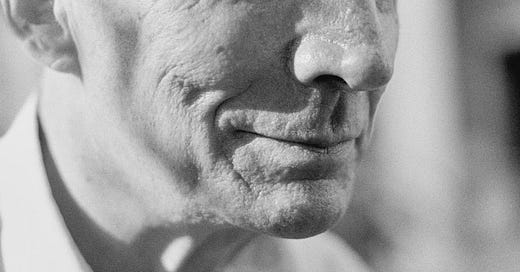Consciousness is a complex topic.
Luckily, legendary Jungian psychologist, Robert A. Johnson, gave us 3 core levels:
Simple consciousness
Complex consciousness
Enlightened consciousness
“Tradition indicates that three levels of consciousness are available to us:
Simple consciousness, not often seen in our modern technological world; complex consciousness, the usual state of educated Western man; and an enlightened state of consciousness, known only to a very few individuals, which is the culmination of human evolution and can be attained only by highly motivated people after much work and training”
– Robert A. Johnson, ‘Transformation’
He also told 3 classic stories explaining each level:
Don Quixote
Shakespeare’s Hamlet
Goethe’s Faust (this one is fascinating)
Here’s the 3 levels of consciousness in Jungian psychology and how to progress (don’t waste your life worrying in the 2nd)…
“Simple man and enlightened man have much in common, including a direct, uncomplicated view of life . . . The only true difference between them is that the enlightened man is conscious of his condition, while the simple man is not”
– Robert A. Johnson
👨🌾 Level 1: Simple Consciousness
“Look there, Sancho Panza, my friend, and see those thirty or so wild giants, with whom I intend to do battle and kill each and all of them”
– ‘Don Quixote,’ Part 1, Ch 8
Don Quixote is a Spanish story.
Considered the first ever novel, it was written in 1605 by Miguel de Cervantes, veteran of the Ottoman-Habsburg Wars, and serial sufferer (he was captured and detained by pirates for 5 years before getting back to Spain – but that’s another story).
The book follows a simpleminded nobleman of the same name.
After reading too many medieval books about chivalrous and errand knights, Quixote sets out to restore honour to the land, and defend the helpless with his trusty (but sceptical) squire, Sancho Panza.
The “thirty or so wild giants” he intends to “do battle” with are windmills.
Don Quixote is a story about simple consciousness.
Robert A. Johnson said this is rarely seen nowadays. It’s not so much about intelligence, but a kind of sheltered upbringing that protected you from the complex and non-fairytale-like reality of the world. Quixote was a nobleman. Born and raised behind castle walls, learning about the world only through sanitised and wishful books.
He saw legend and adventure everywhere he went (even mistaking mundane windmills for a chance at glory).
Ignorance is bliss; simple consciousness is heaven because confounding thoughts of:
Good vs evil
Right and wrong
Awareness of our own flaws
Haven’t torn you from simple and contented life.
Simple consciousness is what the Amish seek to defend (whether it works or not). It can still be observed in extremely isolated and remote tribes, where the gods still live, and the agenda of the day doesn’t stray beyond present happenings.
For the rest of us (with 24/7 global news, productivity gurus, and life-coaches) simple living is lost/exchanged for level 2 at an early age.
⚔️ Level 2: Complex Consciousness
"To be, or not to be, that is the question: Whether ’tis nobler in the mind to suffer The slings and arrows of outrageous fortune, Or to take arms against a sea of troubles" – Shakespeare, 'Hamlet,' Act 3 Scene 1
Hamlet is a Danish prince whose father is murdered and usurped from the throne.
Literally haunted by the memory of his father, honour calls him to take revenge and his rightful place as king – but morality calls him to avoid bloodshed and more death.
Hamlet is modern man and woman.
We know what we must do, but overthinking prevents us from taking action.
In the end (after much stressing and dilly-dallying), Hamlet panics, kills his father’s killer, but botches the job, and dies himself: “Now cracks a noble heart. Good night, sweet prince.” 🫡
Complex consciousness is “smarter” than simple consciousness – but not better.
Only through achieving enlightened consciousness, do we regain our abilities of:
→ Decisive action
→ Simple, contented, and perennially joyful living
☀️ Level 3: Enlightened Consciousness
“As soon as you trust yourself, you will know how to live” – Goethe, 'Faust,' Part. 1, Scene. IV
As Johnson says: simple and complex man have much in common:
They live simply
Know when to act
Believe in a power higher than themselves
The only difference is complex man is aware of the other variables.
She’s been exodused from Eden. Passed through the valley of shadow and death. And has made it to heavenly Jerusalem. Like how the Buddha set out from his sheltered life as a prince, wondered as an ascetic acolyte for 7 years, to then sit under the Bodhi tree, and give up trying so hard.
Through awareness of our flaws, but faith in our nature, we become whole: holy.
“Mara ordered his armies to retreat.
The dark waters of the unconscious closed over Siddhartha, and he slipped into that profound stillness in which thought stops and the distinctions of a separate personality dissolve . . . He was no longer Siddhartha . . . He was the Buddha, “he who is awake.”
He had found the way to that realm of being which decay and death can never touch: nirvana.
– ‘Dhammapada,’ trans. Eknath Easwaran
That’s it!
Let me know your thoughts.
If you liked it, you’ll love this other letter about Jung and Daoism.
Jungian psychology is a powerful tool for life.
But getting started can be a:
Slow
Confusing
Frustrating process
After 5+ years of study, and reading 25+ major titles, I’ve put together a FREE resource to help people avoid overwhelm.
📚 Core ideas that can be applied right away 📩 Delivered in 5 easy and short lessons 🧠 Great foundation for further study ⭐️ Plus, you’ll get:
Digital assets and a tracker
A curated further reading list
Curious?
Get started today HERE (did I mention it’s FREE?).
Suggested reading & bonus links
Transformation by Robert A. Johnson
Interview with Robert A. Johnson






